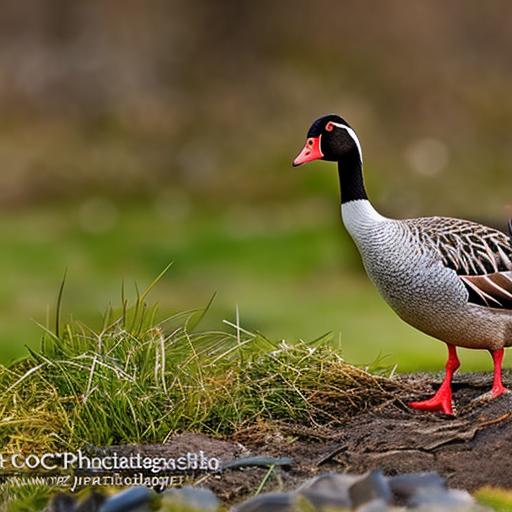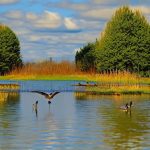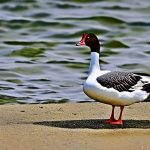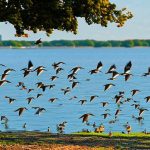Having geese in your yard may seem harmless at first, but it can actually have a negative impact on your property. Geese are known for leaving droppings everywhere they go, which can be unsightly and unsanitary. They also have a tendency to eat plants and grass, causing damage to your lawn and garden. In addition, geese can be aggressive and territorial, posing a threat to you, your family, and your pets. Therefore, it is important to take measures to keep geese away from your yard.
Key Takeaways
- Geese can cause damage to your property and pose health risks.
- Understanding geese behavior can help in deterring them from your yard.
- Natural deterrents like landscaping and decoys can be effective in keeping geese away.
- Physical barriers like fences and netting can prevent geese from entering your yard.
- Consistency is key in maintaining a goose-free zone in your yard.
The Negative Impact of Geese on Your Property
Geese can cause a variety of problems on your property. One of the most obvious issues is the mess they leave behind in the form of droppings. Not only are goose droppings unsightly, but they can also carry diseases and parasites that can be harmful to humans and pets. Cleaning up after geese can be a time-consuming and unpleasant task.
Another problem with having geese in your yard is their tendency to eat plants and grass. Geese are herbivores and will graze on lawns and gardens, causing damage to the vegetation. This can be frustrating for homeowners who have put time and effort into maintaining their landscaping.
Furthermore, geese can be aggressive and territorial, especially during nesting season. They may hiss, flap their wings, or even charge at people or animals that come too close to their nests. This can pose a danger to you, your family, and your pets. It is important to keep geese away from your yard to ensure the safety of everyone on your property.
Understanding the Behavior of Geese
To effectively keep geese away from your yard, it is important to understand their behavior and what attracts them to certain areas. Geese are attracted to areas with open water, such as ponds or lakes, as well as areas with short grass where they can easily graze. They are also attracted to areas with minimal human activity, as they prefer quiet and undisturbed environments.
When geese are in your yard, they may exhibit certain behaviors. They will often walk in a single file line, known as a “goose parade,” and leave droppings along their path. They may also honk loudly to communicate with other geese or to warn of potential threats. During nesting season, geese become more aggressive and territorial, and may hiss, flap their wings, or charge at intruders.
Natural Deterrents to Keep Geese Away
There are several natural deterrents that can help keep geese away from your yard. One option is to plant certain types of plants that geese find unappealing. Geese prefer short grass, so planting taller grasses or native plants with strong scents can help deter them. Some examples include tall fescue, switchgrass, or lavender.
Another natural deterrent is the use of decoys. Geese are social animals and will avoid areas where they see other geese. Placing decoys in your yard can trick geese into thinking that the area is already occupied and discourage them from landing or nesting there. Decoys can be made from materials such as plastic or wood and should be placed strategically around your yard.
Physical Barriers to Prevent Geese from Entering Your Yard
Physical barriers can be an effective way to keep geese out of your yard. One option is to install a fence around your property. A fence should be at least three feet high and have small openings or mesh to prevent geese from squeezing through. It is also important to bury the bottom of the fence at least six inches deep to prevent geese from digging under it.
Another option is to use netting to cover areas where geese are likely to land or graze. Netting should be stretched tightly across the ground and secured with stakes to prevent geese from getting underneath. This can be particularly effective in areas such as gardens or flower beds where geese may be attracted to the vegetation.
The Use of Repellents to Keep Geese Out
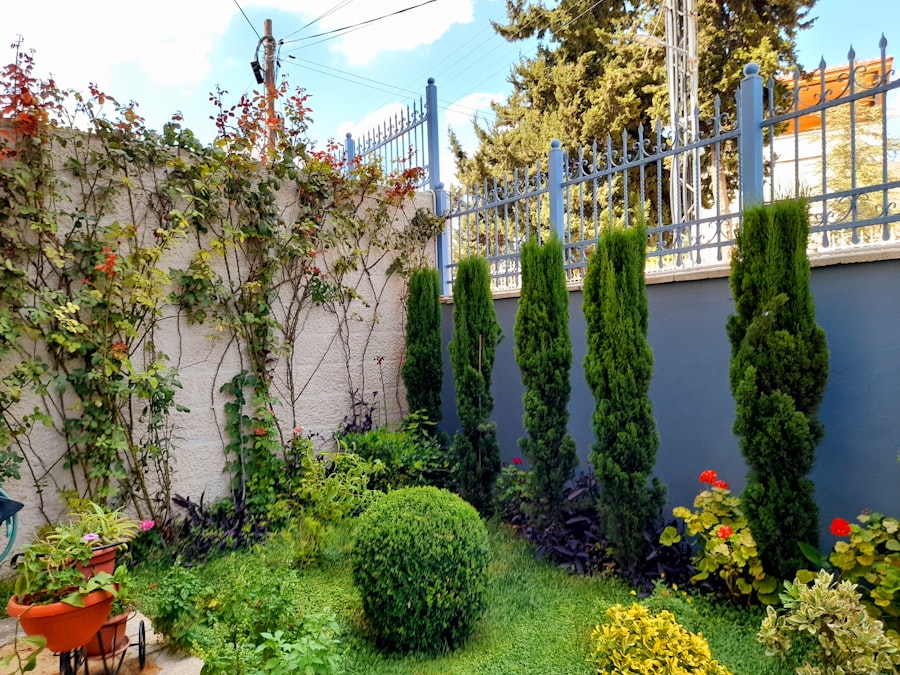
Repellents can be an effective way to keep geese away from your yard. There are several types of repellents available, including visual, auditory, and taste-based repellents. Visual repellents, such as reflective tape or scare balloons, can create a deterrent by creating movement and reflecting light. Auditory repellents, such as noise-making devices or wind chimes, can scare geese away with loud noises. Taste-based repellents, such as bitter sprays or granules, can make the grass or plants in your yard unappealing to geese.
When using repellents, it is important to follow the instructions carefully and reapply as needed. Keep in mind that geese may become accustomed to certain repellents over time, so it may be necessary to switch up your tactics periodically.
Scare Tactics to Keep Geese at Bay
Scare tactics can be an effective way to keep geese away from your yard. One option is to use loud noises to startle geese and encourage them to leave. This can be done by clapping your hands, banging pots and pans together, or using a noise-making device such as an air horn. Another option is to use motion-activated sprinklers that will spray water when geese approach. This can startle them and make them think twice about landing or nesting in your yard.
It is important to note that scare tactics may only provide temporary relief and may need to be used in conjunction with other deterrents for long-term success.
Creating a Goose-Free Zone in Your Yard
Creating a designated goose-free zone in your yard can help keep geese away from areas where you spend the most time. This can be done by installing physical barriers, such as fences or netting, around specific areas of your yard, such as patios or play areas. It is also important to remove any food sources, such as bird feeders or pet food, from these areas to discourage geese from congregating.
In addition, you can make the goose-free zone more appealing to other wildlife by providing alternative food sources, such as bird feeders or native plants that attract butterflies and bees. This can help create a balanced ecosystem in your yard and encourage other wildlife to visit.
The Importance of Consistency in Keeping Geese Away
Consistency is key when it comes to keeping geese away from your yard. Geese are creatures of habit and will quickly return to an area if they find it to be a suitable habitat. Therefore, it is important to be consistent in your efforts to deter geese and to regularly monitor your yard for signs of their presence.
This means consistently using deterrents, maintaining physical barriers, and removing any food sources that may attract geese. It is also important to address any potential attractants in neighboring yards or public spaces, as geese may be drawn to these areas and then venture into your yard.
Seeking Professional Help for Persistent Goose Problems
If you have tried various methods to keep geese away from your yard but are still experiencing persistent problems, it may be necessary to seek professional help. A reputable wildlife control company can assess your situation and provide expert advice and assistance in dealing with geese.
When choosing a wildlife control company, it is important to do your research and find one that has experience in dealing with geese specifically. Ask for references and read reviews from previous customers to ensure that you are working with a reputable company. Additionally, make sure that the company uses humane methods to deter geese and does not harm or kill them.
In conclusion, having geese in your yard can have a negative impact on your property. They can damage your lawn and plants, leave unsightly droppings, and pose a threat to your safety. However, there are several methods you can use to keep geese away from your yard. By understanding their behavior, using natural deterrents, installing physical barriers, using repellents, employing scare tactics, creating a designated goose-free zone, and being consistent in your efforts, you can effectively keep geese at bay. If all else fails, don’t hesitate to seek professional help to deal with persistent goose problems.
If you’re looking for effective ways to keep geese out of your yard, you might find this article on Poultry Wizard helpful. They provide valuable insights on how to care for goslings, which can be particularly useful in preventing geese from invading your property. Check out their article on how to care for goslings to learn more about keeping these feathered intruders at bay.
FAQs
What are some effective ways to keep geese out of my yard?
There are several ways to keep geese out of your yard, including installing physical barriers such as fences or netting, using decoys or scare tactics, and removing any potential food sources.
Why do geese come into my yard?
Geese may come into your yard in search of food, water, or a place to rest. They may also be attracted to open spaces or bodies of water.
Are geese dangerous?
Geese can be aggressive and may attack humans if they feel threatened or if they are protecting their young. It is important to keep a safe distance from geese and avoid approaching them.
What should I do if geese have already taken up residence in my yard?
If geese have already taken up residence in your yard, it is important to discourage them from staying by removing any potential food sources and using scare tactics. You may also want to consider contacting a wildlife removal service for assistance.
Can I legally harm or kill geese to keep them out of my yard?
It is illegal to harm or kill geese without a permit from the appropriate wildlife agency. There are humane and effective ways to deter geese from your yard without resorting to violence.
Meet Walter, the feathered-friend fanatic of Florida! Nestled in the sunshine state, Walter struts through life with his feathered companions, clucking his way to happiness. With a coop that’s fancier than a five-star hotel, he’s the Don Juan of the chicken world. When he’s not teaching his hens to do the cha-cha, you’ll find him in a heated debate with his prized rooster, Sir Clucks-a-Lot. Walter’s poultry passion is no yolk; he’s the sunny-side-up guy you never knew you needed in your flock of friends!

